高一英语必修一Unit4重要知识点总结语法外研版
- 格式:doc
- 大小:17.83 KB
- 文档页数:2
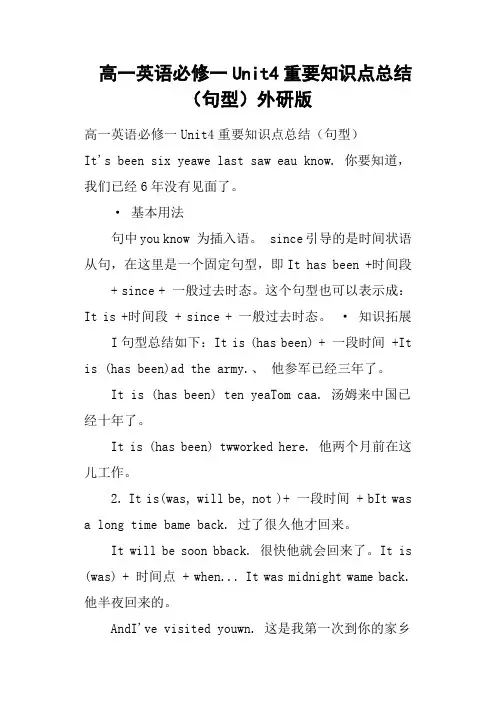
高一英语必修一Unit4重要知识点总结(句型)外研版高一英语必修一Unit4重要知识点总结(句型)It's been six yeawe last saw eau know. 你要知道,我们已经6年没有见面了。
· 基本用法句中you know 为插入语。
since引导的是时间状语从句,在这里是一个固定句型,即It has been +时间段 + since + 一般过去时态。
这个句型也可以表示成:It is +时间段 + since + 一般过去时态。
· 知识拓展 I句型总结如下:It is (has been) + 一段时间 +It is (has been)ad the army.、他参军已经三年了。
It is (has been) ten yeaTom caa. 汤姆来中国已经十年了。
It is (has been) twworked here. 他两个月前在这儿工作。
2. It is(was, will be, not )+ 一段时间 + bIt wasa long time bame back. 过了很久他才回来。
It will be soon bback. 很快他就会回来了。
It is (was) + 时间点 + when... It was midnight wame back. 他半夜回来的。
AndI've visited youwn. 这是我第一次到你的家乡来参观。
· 基本用法句型结构“This + is + the + 序数词 + time + that 从句”中的time前面有序数词来修饰,后面的从句一般要用完成时。
如:Tdat he has been to Beijing. 这是他第二次取北京。
· 知识拓展It'at.... 该...时候了 It's higat.... 该...时候了 It'at you went to bed. = It'u to go to bed. 到了你上床睡觉的时候了。
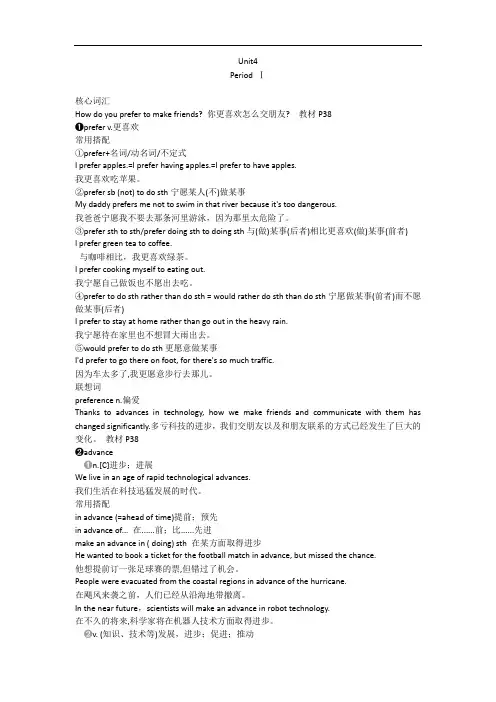
Unit4Period Ⅰ核心词汇How do you prefer to make friends? 你更喜欢怎么交朋友? 教材P38➊prefer v.更喜欢常用搭配①prefer+名词/动名词/不定式I prefer apples.=I prefer having apples.=I prefer to have apples.我更喜欢吃苹果。
②prefer sb (not) to do sth宁愿某人(不)做某事My daddy prefers me not to swim in that river because it's too dangerous.我爸爸宁愿我不要去那条河里游泳,因为那里太危险了。
③prefer sth to sth/prefer doing sth to doing sth与(做)某事(后者)相比更喜欢(做)某事(前者)I prefer green tea to coffee.与咖啡相比,我更喜欢绿茶。
I prefer cooking myself to eating out.我宁愿自己做饭也不愿出去吃。
④prefer to do sth rather than do sth = would rather do sth than do sth宁愿做某事(前者)而不愿做某事(后者)I prefer to stay at home rather than go out in the heavy rain.我宁愿待在家里也不想冒大雨出去。
⑤would prefer to do sth更愿意做某事I'd prefer to go there on foot, for there's so much traffic.因为车太多了,我更愿意步行去那儿。
联想词preference n.偏爱Thanks to advances in technology, how we make friends and communicate with them has changed significantly.多亏科技的进步,我们交朋友以及和朋友联系的方式已经发生了巨大的变化。
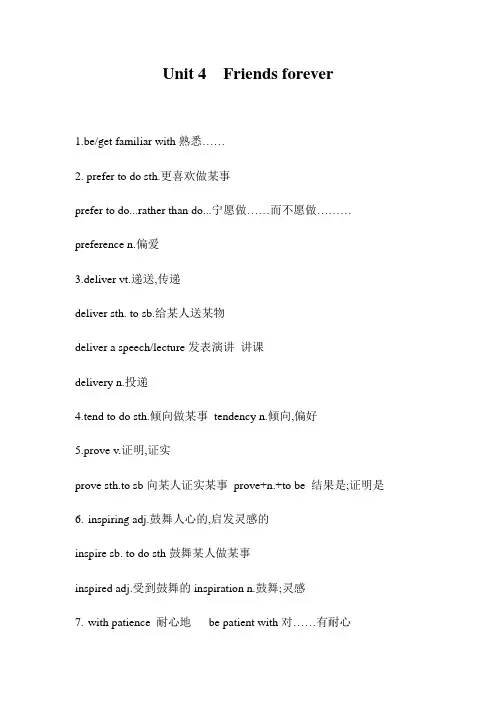
Unit 4 Friends forever
1.be/get familiar with熟悉……
2. prefer to do sth.更喜欢做某事
prefer to do...rather than do...宁愿做……而不愿做………preference n.偏爱
3.deliver vt.递送,传递
deliver sth. to sb.给某人送某物
deliver a speech/lecture发表演讲讲课
delivery n.投递
4.tend to do sth.倾向做某事tendency n.倾向,偏好
5.prove v.证明,证实
prove sth.to sb向某人证实某事prove+n.+to be 结果是;证明是6.inspiring adj.鼓舞人心的,启发灵感的
inspire sb. to do sth鼓舞某人做某事
inspired adj.受到鼓舞的inspiration n.鼓舞;灵感
7.with patience 耐心地be patient with对……有耐心
8.quality n.素质质量of high quality质量高
9. distance v.使与……保持距离n.距离
in the distance在远处at a distance(of)距离……远的地方keep one’s distance from sb与……保持距离
distant adj.遥远的
10.scene n.场景地点on the scene在场;出现;到场;当场。

Unit 4 Friends forever1.With no familiar faces in view...看不到熟悉的面孔……2.How do you prefer to make friends?你更喜欢如何交朋友?3.What if the only way of getting news from faraway friends was writing letters that took ages to be delivered?如果从远方的朋友那里得到消息的唯一方法是写信,这需要花很长的时间才能送达会怎样呢?4.On social media sites,people tend to post only positive updates that make them appear happy and friendly.在社交媒体网站上,人们倾向于只发布积极的最新消息,这使他们看起来很开心和友好。
5.Although technology has changed the way we acquire friends,the meaning of friendship and our longing for friends remain the same.虽然科技改变了我们结交朋友的方式,但友谊的意义和我们对朋友的渴望依然不变。
6.To prove that making friends was easier in the past.为了证明过去交友更容易。
【词汇精讲】prove在句中是及物动词,意为“证明;证实”,后面可接名词或从句作宾语。
7.How would you feel if moving to a new town meant losing track of your friends?如果搬到新的城市意味着和朋友失去联系,你会感觉如何?【句式剖析】本句中的if moving to a new town是省略句,句子补全应为If you are moving to a new town。
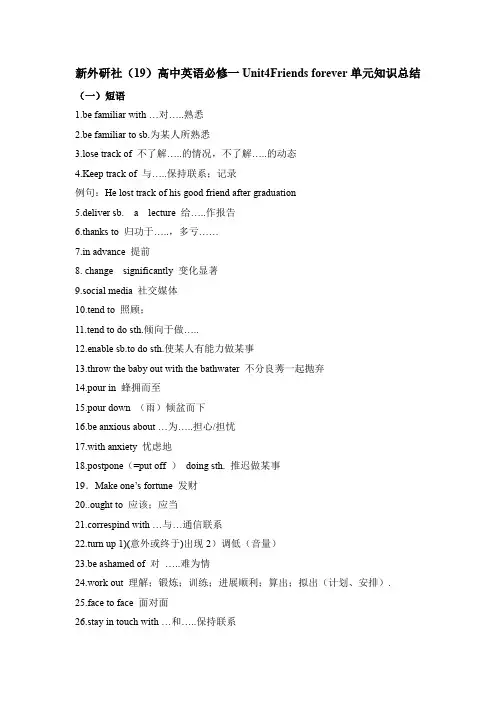
新外研社(19)高中英语必修一Unit4Friends forever单元知识总结(一)短语1.be familiar with …对…..熟悉2.be familiar to sb.为某人所熟悉3.lose track of 不了解…..的情况,不了解…..的动态4.Keep track of 与…..保持联系;记录例句:He lost track of his good friend after graduation5.deliver sb. a lecture 给…..作报告6.thanks to 归功于…..,多亏……7.in advance 提前8. change significantly 变化显著9.social media 社交媒体10.tend to 照顾;11.tend to do sth.倾向于做…..12.enable sb.to do sth.使某人有能力做某事13.throw the baby out with the bathwater 不分良莠一起抛弃14.pour in 蜂拥而至15.pour down (雨)倾盆而下16.be anxious about …为…..担心/担忧17.with anxiety 忧虑地18.postpone(=put off )doing sth. 推迟做某事19.Make one’s fortune 发财20..ought to 应该;应当21.correspind with …与…通信联系22.turn up 1)(意外或终于)出现2)调低(音量)23.be ashamed of 对…..难为情24.work out 理解;锻炼;训练;进展顺利;算出;拟出(计划、安排).25.face to face 面对面26.stay in touch with …和…..保持联系27.are up to 从事28.keep in mind 记住29.make friends online 网上交朋友30.make it clear to sb. that 对某人清楚表明31.be set in 以…为背景32.on earth 地球上33.figure out 计算出;理解34.hear from sb.收到某人来信35.strike the match 划火柴36.a plain clothes 便服37.step out of 迈步走出38.felt lost 感到茫然39.in my opinion(=in my view )我认为40.in the distance 在远处(二)句型1.(教材p 39 ) As Aristotle said, no one would choose to live without friends ,even ifhe had all other goods.As sb. said 正如某人所说As 引导的非限制性定语从句,指代整个主句,并作从句的宾语。
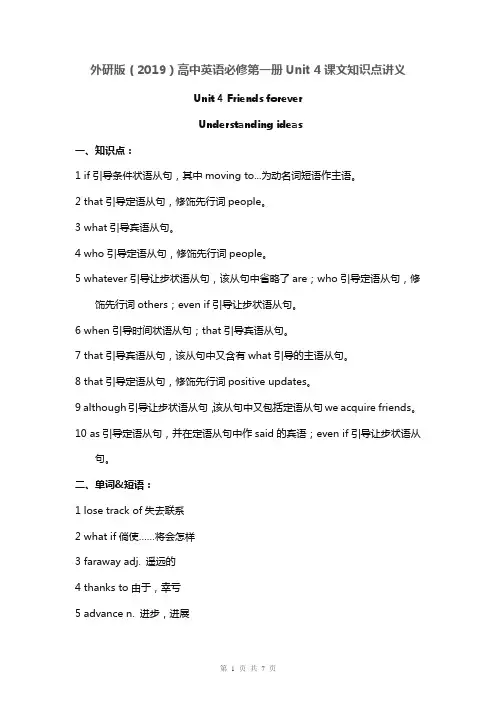
外研版(2019)高中英语必修第一册Unit 4课文知识点讲义Unit 4 Friends foreverUnderstanding ideas一、知识点:1 if引导条件状语从句,其中moving to...为动名词短语作主语。
2 that引导定语从句,修饰先行词people。
3 what引导宾语从句。
4 who引导定语从句,修饰先行词people。
5 whatever引导让步状语从句,该从句中省略了are;who引导定语从句,修饰先行词others;even if引导让步状语从句。
6 when引导时间状语从句;that引导宾语从句。
7 that引导宾语从句,该从句中又含有what引导的主语从句。
8 that引导定语从句,修饰先行词positive updates。
9 although引导让步状语从句,该从句中又包括定语从句we acquire friends。
10 as引导定语从句,并在定语从句中作said的宾语;even if引导让步状语从句。
二、单词&短语:1 lose track of失去联系2 what if倘使……将会怎样3 faraway adj. 遥远的4 thanks to由于,幸亏5 advance n. 进步,进展6 make friends交朋友7 communicate with与……交流8 significantly adv. 重大地;显著地9 stay in touch with与……保持联系10 social media 社交媒体11 up to忙于12 maintain v. 保持,维持13 digital adj. 数字的,数码的14 enable v. 使可能,使发生15 unusual adj. 异常的,不平常的16 meaningful adj. 有意义的17 keep in mind 记住18 site n. 网站19 tend v. 易于做某事,往往会发生某事20 criminal n.罪犯21 bathwater n.洗澡水throw the baby out with the bathwater不分良莠一起抛弃22 long for渴望三、课文CLICK FOR A FRIEND?How would you feel (1) if moving to a new town meant losing track of your friends? What if the only way of getting news from farawayfriends was writing letters that took ages to be delivered? This was how things worked not very long ago. Thanks to advances in technology, how we make friends and communicate with them has changed significantly.Nowadays, we can move around the world and still stay in touch with the people (2) that we want to remain friends with. Social media tools let us see (3) what our friends are up to and maintain friendships. All you need is a wi-fi connection.The digital age also enables us to find people (4) who share our interests, such as collecting model cars or playing an unusual instrument.(5) Whatever our hobbies, the Internet can connect us with others who also enjoy doing them, even if they live on the other side of the world.But (6) when you "friend" people online, does this mean that they really are your friends?It depends.If people always exchange true personal information online, then yes, these friendships can be real and meaningful. But we need to keep in mind (7) that what we see on social media is often not the whole truth about a person. fOn social media sites, people tend to post only positive updates (8) that make them appear happy and friendly. But smiling photos can hide real problems. Remember the saying: on the Internet, nobody knows you' re a dog. A young person could be old; a woman could be a man; we。

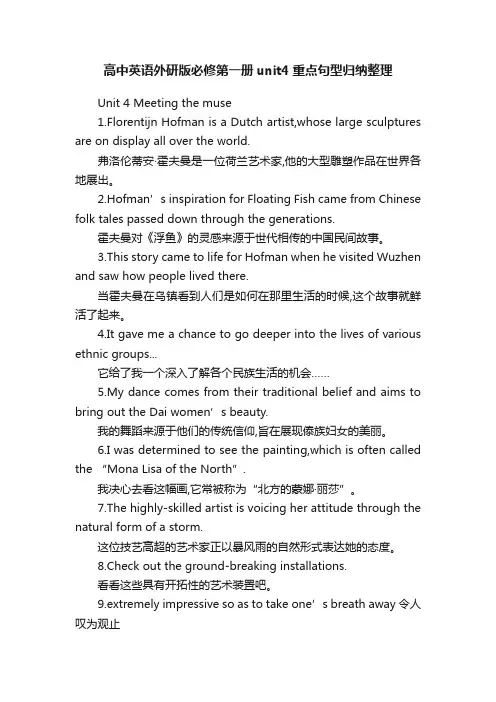
高中英语外研版必修第一册unit4重点句型归纳整理Unit 4 Meeting the muse1.Florentijn Hofman is a Dutch artist,whose large sculptures are on display all over the world.弗洛伦蒂安·霍夫曼是一位荷兰艺术家,他的大型雕塑作品在世界各地展出。
2.Hofman’s inspiration for Floating Fish came from Chinese folk tales passed down through the generations.霍夫曼对《浮鱼》的灵感来源于世代相传的中国民间故事。
3.This story came to life for Hofman when he visited Wuzhen and saw how people lived there.当霍夫曼在乌镇看到人们是如何在那里生活的时候,这个故事就鲜活了起来。
4.It gave me a chance to go deeper into the lives of various ethnic groups...它给了我一个深入了解各个民族生活的机会……5.My dance comes from their traditional belief and aims to bring out the Dai women’s beauty.我的舞蹈来源于他们的传统信仰,旨在展现傣族妇女的美丽。
6.I was determined to see the painting,which is often called the “Mona Lisa of the North”.我决心去看这幅画,它常被称为“北方的蒙娜·丽莎”。
7.The highly-skilled artist is voicing her attitude through the natural form of a storm.这位技艺高超的艺术家正以暴风雨的自然形式表达她的态度。
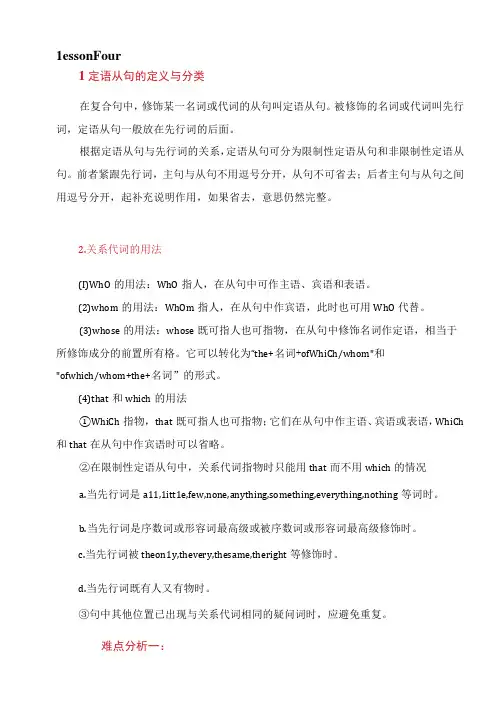
1essonFour1定语从句的定义与分类在复合句中,修饰某一名词或代词的从句叫定语从句。
被修饰的名词或代词叫先行词,定语从句一般放在先行词的后面。
根据定语从句与先行词的关系,定语从句可分为限制性定语从句和非限制性定语从句。
前者紧跟先行词,主句与从句不用逗号分开,从句不可省去;后者主句与从句之间用逗号分开,起补充说明作用,如果省去,意思仍然完整。
2.关系代词的用法(I)WhO的用法:WhO指人,在从句中可作主语、宾语和表语。
(2)whom的用法:WhOm指人,在从句中作宾语,此时也可用WhO代替。
(3)whose的用法:whose既可指人也可指物,在从句中修饰名词作定语,相当于所修饰成分的前置所有格。
它可以转化为“the+名词+ofWhiCh/whom"和"ofwhich/whom+the+名词”的形式。
(4)that和which的用法①WhiCh指物,that既可指人也可指物;它们在从句中作主语、宾语或表语,WhiCh 和that在从句中作宾语时可以省略。
②在限制性定语从句中,关系代词指物时只能用that而不用which的情况a.当先行词是a11,1itt1e,few,none,anything,something,everything,nothing等词时。
b.当先行词是序数词或形容词最高级或被序数词或形容词最高级修饰时。
c.当先行词被theon1y,thevery,thesame,theright等修饰时。
d.当先行词既有人又有物时。
③句中其他位置已出现与关系代词相同的疑问词时,应避免重复。
难点分析一:(I)Whatif用于提出假设时,意思是“倘若……,假若……怎么办,要是……将会怎么样”,其后句子可用陈述语气(一般现在时),也可用虚拟语气(一般过去时或ShOUk1+动词原形;若是针对过去情况,从句则用过去完成时)。
(2)Whatif表示邀请或建议时,意思是“……怎么样?如果……如何?”。
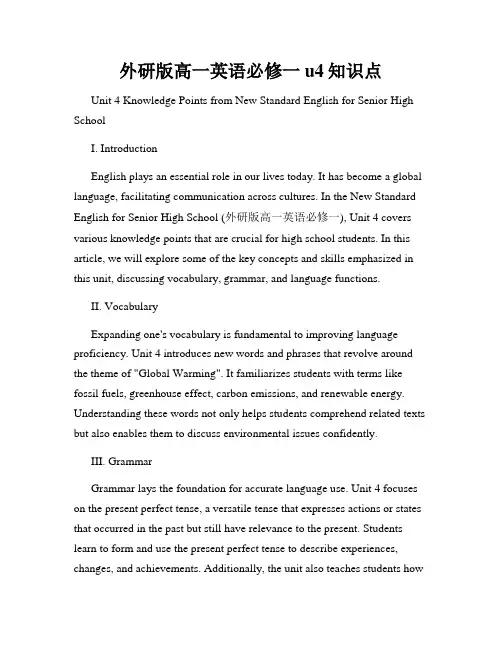
外研版高一英语必修一u4知识点Unit 4 Knowledge Points from New Standard English for Senior High SchoolI. IntroductionEnglish plays an essential role in our lives today. It has become a global language, facilitating communication across cultures. In the New Standard English for Senior High School (外研版高一英语必修一), Unit 4 covers various knowledge points that are crucial for high school students. In this article, we will explore some of the key concepts and skills emphasized in this unit, discussing vocabulary, grammar, and language functions.II. VocabularyExpanding one's vocabulary is fundamental to improving language proficiency. Unit 4 introduces new words and phrases that revolve around the theme of "Global Warming". It familiarizes students with terms like fossil fuels, greenhouse effect, carbon emissions, and renewable energy. Understanding these words not only helps students comprehend related texts but also enables them to discuss environmental issues confidently.III. GrammarGrammar lays the foundation for accurate language use. Unit 4 focuses on the present perfect tense, a versatile tense that expresses actions or states that occurred in the past but still have relevance to the present. Students learn to form and use the present perfect tense to describe experiences, changes, and achievements. Additionally, the unit also teaches students howto use "yet", "already", and "ever" in questions and negative statements. This grammar point enhances students' ability to express themselves in a clear and precise manner.IV. Language FunctionsLanguage functions refer to the specific purposes for which language is used. Unit 4 emphasizes two crucial language functions: talking about cause and effect and expressing purpose. Students learn to use appropriate connectors such as "because", "so", and "although" to discuss the relationship between events or phenomena. They also explore how to express purpose using phrases like "in order to" and "so that". These language functions enable students to convey ideas effectively and coherently.V. Reading ComprehensionUnit 4 provides a variety of reading materials to improve students' reading comprehension skills. The texts cover different formats, including news articles, interviews, and informative passages. By reading these texts, students gain valuable insights into global warming and its impact on the environment. They learn to identify main ideas, infer information, and analyze the author's perspective. Through guided activities, they develop critical thinking skills and enhance their ability to grasp the main points of a text.VI. Speaking and WritingUnit 4 emphasizes speaking and writing skills, allowing students to practice using the language in meaningful contexts. Through pair or groupwork, students engage in discussions, debates, and role-plays related to environmental issues. These activities foster collaborative learning and encourage students to express their opinions, build arguments, and listen actively to others. The unit also provides writing tasks that require students to write formal letters, reports, and articles. By honing their speaking and writing skills, students develop effective communication strategies for various real-life situations.VII. ConclusionUnit 4 of the New Standard English for Senior High School offers invaluable knowledge for high school students in their English language learning journey. By focusing on vocabulary, grammar, language functions, reading comprehension, speaking, and writing, this unit equips students with the necessary tools to become proficient English users. Mastering these knowledge points enables students to express themselves fluently, understand a wide range of texts, and navigate different communication situations. With continued practice and dedication, students will further enhance their language skills and achieve success in their academic and personal pursuits.。
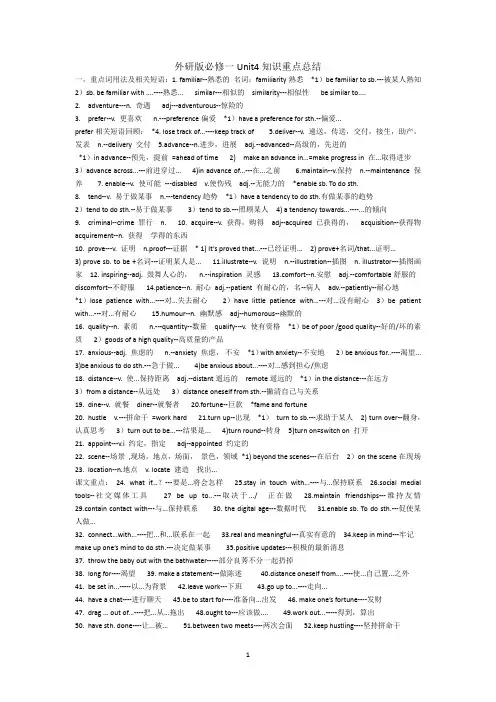
外研版必修一Unit4知识重点总结一,重点词用法及相关短语:1. familiar--熟悉的名词:familiarity熟悉*1)be familiar to sb.---被某人熟知2)sb. be familiar with ....----熟悉... similar---相似的similarity---相似性be similar to....2.adventure---n. 奇遇adj---adventurous--惊险的3.prefer--v. 更喜欢n.---preference偏爱*1)have a preference for sth.--偏爱...prefer相关短语回顾:*4. lose track of...----keep track of 5.deliver--v. 递送,传送,交付,接生,助产,发表n.--delivery 交付 5.advance--n.进步,进展adj.--advanced--高级的,先进的*1)in advance--预先,提前=ahead of time 2) make an advance in...=make progress in 在...取得进步3)advance across...---前进穿过... 4)in advance of...---在...之前 6.maintain--v.保持n.--maintenance 保养7. enable--v. 使可能---disabled v.使伤残adj.--无能力的*enable sb. To do sth.8.tend--v. 易于做某事n.---tendency趋势*1)have a tendency to do sth.有做某事的趋势2)tend to do sth.--易于做某事3)tend to sb.---照顾某人4) a tendency towards...----...的倾向9.criminal--crime罪行n. 10. acquire--v. 获得,购得adj--acquired 已获得的,acquisition--获得物acquirement--n. 获得学得的东西10.prove---v. 证明n.proof---证据* 1) It’s proved that...---已经证明... 2) prove+名词/that...证明...3)prove sb. to be +名词---证明某人是... 11.illustrate--v. 说明n.--illustration--插图n. illustrator---插图画家12. inspiring--adj. 鼓舞人心的,n.--inspiration 灵感fort--n.安慰adj.--comfortable舒服的discomfort--不舒服14.patience--n. 耐心adj.--patient 有耐心的,名--病人adv.--patiently--耐心地*1)lose patience with...----对...失去耐心2)have little patience with...---对...没有耐心3)be patient with...---对...有耐心15.humour--n. 幽默感adj--humorous--幽默的16.quality--n. 素质n.---quantity--数量qualify---v. 使有资格*1)be of poor /good quality--好的/坏的素质2)goods of a high quality--高质量的产品17.anxious--adj. 焦虑的n.--anxiety 焦虑,不安*1)with anxiety--不安地2)be anxious for..----渴望...3)be anxious to do sth.---急于做... 4)be anxious about...----对...感到担心/焦虑18.distance--v. 使...保持距离adj.--distant遥远的remote遥远的*1)in the distance---在远方3)from a distance--从远处3)distance oneself from sth.--撇清自己与关系19.dine--v. 就餐diner--就餐者20.fortune--巨款*fame and fortune20.hustle v.---拼命干=work hard 21.turn up--出现*1)turn to sb.---求助于某人2) turn over--翻身,认真思考3)turn out to be...---结果是... 4)turn round--转身5)turn on=switch on 打开21.appoint---v.i 约定,指定adj--appointed 约定的22.scene--场景,现场,地点,场面,景色,领域*1) beyond the scenes---在后台2)on the scene在现场23.location--n.地点v. locate 建造找出...课文重点:24. what if...?---要是...将会怎样25.stay in touch with...----与...保持联系26.social medial tools--社交媒体工具27 be up to...---取决于.../ 正在做28.maintain friendships---维持友情29.contain contact with---与...保持联系30. the digital age---数据时代31.enable sb. To do sth.---促使某人做...32.connect...with...----把...和...联系在一起33.real and meaningful---真实有意的34.keep in mind---牢记make up one’s mind to do sth.---决定做某事35.positive updates---积极的最新消息37.throw the baby out with the bathwater-----部分良莠不分一起扔掉38.long for----渴望39. make a statement---做陈述40.distance oneself from....----使...自己置...之外41.be set in...-----以...为背景42.leave work---下班43.go up to...----走向...44.have a chat----进行聊天45.be to start for----准备向...出发46. make one’s fortune----发财47.drag ... out of...----把...从...拖出48.ought to---应该做.... 49.work out...-----得到,算出50.have sth. done----让...被... 51.between two meets----两次会面52.keep hustling----坚持拼命干53.at the appointed place----在约定的地方54. strike the match---划着火柴55.a plain clothes man----一位便衣警察56.step out of...----走出... 57.a familiar-looking man----一位长相熟悉的面孔二.重点句型及句式:1.What if the only way of getting news from faraway friends was writing letters that took ages to be delivered ? -----getting news from faraway friends 为ways的后置定语,writing...为表语,that后为定语从句1)What if... ?如果... 将会怎样?---后跟陈述句,表建议或假设,表假设时候可以用虚拟语气如:What if I fail ?2.Whatever our hobbies, the Internet can connect us with others who also enjoy doing them, even if they live on the other side of the world.-----让步状语从句和定语从句3.But we need to keep in mind that what we see on social media is often not the whole truth about a person.----that引导宾语从句,宾从中又包含一个what引导的主语从句4.Although technology has changed the way we acquire friends, the meaning of friendship and our longing for friends remain the same.-----although引导让步状语从句,让步状语从句中又包含一个定语从句,主句为主系表结构。
Unit4.Friends forever 重点知识点:SectionA.①click v.点击(鼠标)②lose track of不了解……的情况,不了解…的动态③the way of doing sth.做某事的方法④deliver v.递送,传送⑤thanks to归功于………,多亏………⑥advance n.进步,进展※ in advance提前⑦communicate with sb.与某人交流⑧significantly adv.重大地,显著地⑨stay in touch with与…保持联系⑩social media社交媒体11. be up to sth.忙于某事12.maintain v.保持,维持13.wi-fi n.无线网络,无线上网14.digital adj.数字的,数码的※the digital age数字时代a digital camera数码相机15. enable v.使可能,使发生※enable sb. to do sth.使某人能够做某事16.unusual ad.异常的,不平常的17.play an instrument演奏乐器18. connect… with…把…与联系起来19. friend vt.(社交网站上)加为好友20. meaningful adj.有意义的21. keep in mind that将……牢记于心22.site n.网站23.tend v.易于做某事,往往会发生某事※tend to do sth.易于做某事,往往会做某事24.update n.最新消息25.make sb. do sth.让某人做某事※变为被动语态时,do前省略的不定式符号to要带上。
26.saying n.格言,谚语,警句27.criminal n.罪犯28. throw the baby out with the bathwater 不分良莠一起抛弃※ bathwater .n浴水,洗澡水29. acquire v.获得,得到30.a longing for sth.对某物的渴望31.remain link v.仍然是;保持不变32.choose to do sth.选择做某事33. even if =even though即使;尽管34.goods /gudz/n.商品原文长难句分析:1、How would you feel if moving to a new town meant losing track of your friends?.---moving to a new town是现在分词短语,在从句中作主语。
Module4 知识点总结重点短语:1.attractive (adj) 吸引人的2.fortunate (adj) 幸运的3.It sounds great. (sound听起来+adj)It sounds like a good idea. (sound like听起来像+n)4.bother (v) 打扰5.rent (v)租用(n)租金(“......的租金”用介词for.如:the rent for an apartment)6. approach (v)靠近(n)方法(“......的方法”用介词to)7. pretty (adj) 漂亮的(adv)相当;很8.starve (vi) 饿死(e.g. I am starving.快要饿死了)9.park (v) 停车(n) 公园10. lively (adj) 活泼的;充满活力的11. be made of 由......制成(能看出原材料)be made from 由......制成(看不出原材料)12.put up houses修建(房屋)put up tents 搭建(帐篷)put up posters 张贴(海报)13.employment (n) 就业14.exchange students 交换生15.get away from 逃离;摆脱16.a great many+复数n “许多”a number of +复数n “许多”(谓语动词用复数)The number of+复数n “...的数量”(谓语动词用单数)*注:此处谓语动词的单复数为考察重点The number of students is 55.A number of students are studying in the classroom.17.make it 做成功18.remain (v) 保持19.afford (v)买得起20.survive (v) 幸存21.contact sb. 联系(某人)22.go up 上升go down下降23.What’s the climate like?=How’s the climate?重点语法:1.since的用法①since引导的时间状语从句用过去时,主句用现在完成时②It is/has been +时间段+since从句“自从......已经多久了”③since+点时间(since 1999)2.现在完成时1.当出现so far/up to now/till now(到目前为止);these days;for+段时间;since+点时间/从句等时间状语,或already,yet等副词时,句子的时态用现在完成时。
2023外研版高一英语必修一Unit4重点知
识
本文档将重点介绍2023外研版高一英语必修一Unit4的相关知识。
1. 单词和短语
本单元涉及的重点单词和短语包括:
- poverty:贫穷
- charity:慈善
- empathy:同理心
- gratitude:感激之情
- stereotype:刻板印象
- bias:偏见
- volunteer:志愿者
- optimism:乐观主义
2. 语法知识
本单元的重点语法知识有:
- 宾语从句:介绍如何使用宾语从句来表达他人的感受和态度。
- 特殊疑问句:研究如何使用特殊疑问词来构造疑问句,以获
取他人的意见和信息。
- used to和be used to:掌握used to和be used to的用法和区别。
3. 阅读和听力技巧
本单元的阅读和听力技巧包括:
- 掌握关键词和上下文推测词义的能力,快速理解文章和对话
的主题和要点。
- 注意细节,提高阅读和听力的准确性。
- 学会有针对性地提问以提高对文章和对话的理解能力。
4. 写作技巧
本单元的写作技巧有:
- 研究如何写一篇有关慈善的英文演讲稿。
- 掌握描述人物外貌和性格特征的表达方式。
- 学会使用恰当的连接词来连接句子和段落,使文章结构更加清晰和连贯。
5. 文化知识
本单元还将介绍一些与慈善和社会问题相关的文化知识,例如不同国家的慈善组织和相关的传统节日。
以上是2023外研版高一英语必修一Unit4的重点知识概述,希望对您有所帮助!。
定语从句定语从句在句中作定语,修饰名词或代词,被修饰的名词或代词被称为先行词。
定语从句通常跟在先行词之后,由关系词(关系代词或关系副词)引出。
关系代词有:who, whom, whose, that,which等。
关系副词有:when, where, why等。
1. 关系代词引导的定语从句:关系代词所代替的先行词是表示人或物的名词或代词,并在从句中充当主语、宾语等成分。
关系代词在定语从句中作主语时,从句谓语动词的人称和数要和先行词保持一致。
(1) who, whom, that这些词代替的先行词是表示人的名词或代词,在从句中作主语或宾语。
如:He is the right person who I want to find for my film.(2) whose 用来指人或物,只用作定语。
若指物时,它还可以用n.+ ofwhich结构来替换。
如:Please pass me the book whose cover is torn.Please pass me the book the cover of which is torn.Please pass me the book of which the cover is torn.(3) which, that所代替的先行词是表示物的名词或代词,在从句中可作主语、宾语等。
如:Italy is a famous city which has a lot of buildings.2. 关系副词引导的定语从句:关系副词前的先行词是表示时间、地点或理由的名词,when, where, why等引导的从句在句中作状语。
关系副词的含义相当于"介词+ which"结构。
如:Beijing is the place where(in which) I was born.Is this the reason why (for which) he refused our offer?3. 判断关系代词与关系副词(1) 用关系代词,还是关系副词取决于从句中的谓语动词。
高一英语必修一Unit4重要知识点总结(语法)外研版
高一英语必修一Unit4重要知识点总结(语法)外研版
现在完成时的用法: 1. 表示过去发生或已经完成的某一动作对现在造成的影响或结果,着眼点是现在。
―Have you had your supper yet? 你吃过晚饭了吗? ―Yes,I have just had it. 是的,我刚刚吃过。
2. 表示过去已经开始,持续到现在的动作或状态。
可以和表示从过
去某一时刻延续到现在(包括“现在”在内) 的一段时间的状语连用:so far, up/till now, since, for the past/last few years, these few days, all the morning, for a long time等。
just,today,this morning,this month,this year,since,all the time。
I haven’t seen my teacher this evening. 今晚我还没见到我的老师。
3. 和already,never,ever,just,before,lately,recently,yet,so far,up to the present,in the past/ last few years 等状语连用。
I have done my homework already. 我已经做完了家庭作业。
4. 常与介词 for,during,in,within,over 等引导的时
间状语连用,表示过去的某一行为一直延续到现在。
I haven’t seen my English teacher in the recent years. 近几年我没见过我的英语老师。
5. 表示反复或习惯性的动作,常与 several times,once,twice,three times,frequently 等频度副词连用。
I have been to the USA once. 我曾去过美国一次。
6. 在“最高级+名词”或在“这是第几次”之后跟定语从句,从句用现在完成时。
This is the third time I have been here.这是我第三次来这儿。
7. 表示从过去到现在没有发生的动作。
I haven’t swept the floor for half a week. 我已半周没拖地了。
8. 用在时间、条件状语从句中,表示从句动作先于主句动作完成。
I'll tell him after you have left. 你走后我将告诉他。
9. have been to 去过……(已回来),have gone to 去……了(或到了或在途中)。
My sister has gone to the USA. 我妹妹已去了美国。
10. 在现在完成时中,终止性动词若与 for,since 等延续性状语连用,需把终止性动词变为 be 动词等的适当形式。
如:die→be dead,join→be in,fall ill→be ill,finish→be over,leave/go→be away,begin→be in,make friends →be friends,
become→be,borrow→keep,arrive/get to/reach/come→be in/be at/stay,dress→be (dressed) in, put on→have, on/wear,meet→stay together。
They have been good friends for years. 他们是多年的好朋友了。
现在完成时和一般过去时区别: 1. 一般过去时表示过去某时发生的动作或单纯叙述过去的事情,强调动作;现在完成时为过去发生的,强调过去的事情对现在的影响,强调的是影响。
2. 一般过去时常与具体的时间状语连用,而现在完成时通常与模糊的时间状语连用,或无时间状语。
一般过去时的时间状语:yesterday, last week,…ago, in 1980, in October, just now等,皆为具体的时间状语。
现在完成时的时间状语:for, since, so far, ever, never, just, yet, till/until, up to now, in past years, always等,皆不确定的时间状语。
共同的时间状语:this morning, tonight, this April, now, already, recently, lately 等。
3. 现在完成时可表示持续到现在的动作或状态,动词一般是延续性的,如live, teach, learn, work, study,know。
一般过去时常用的非持续性动词有come, go, leave, start, die, finish, become, get married等。
如: I saw this film yesterday.我昨天看了这部电影。
(强调看的动作发生过了) I have seen this film. 我看过这部电影。
(强调对现在的影响,电影的内容已经知道了) Why did you get up so early? 你为什么起得这么早?(强调起床的动作已发生过了) Who hasn't handed in his paper? 谁还没有交卷子?(强调有卷子未交,疑为不公平竞争) He has been in the League for three years. 他入团已经三年了。
(在团内的状态可延续) 句子中如有过去时的时间副词(如yesterday, last, week, in 1960)时,不能使用现在完成时,要用过去时。
如:汤姆昨天晚上给他父母写了一封信。
(错)Tom has written a letter to his parents last night. (对)Tom wrote a letter to his parents last night.。